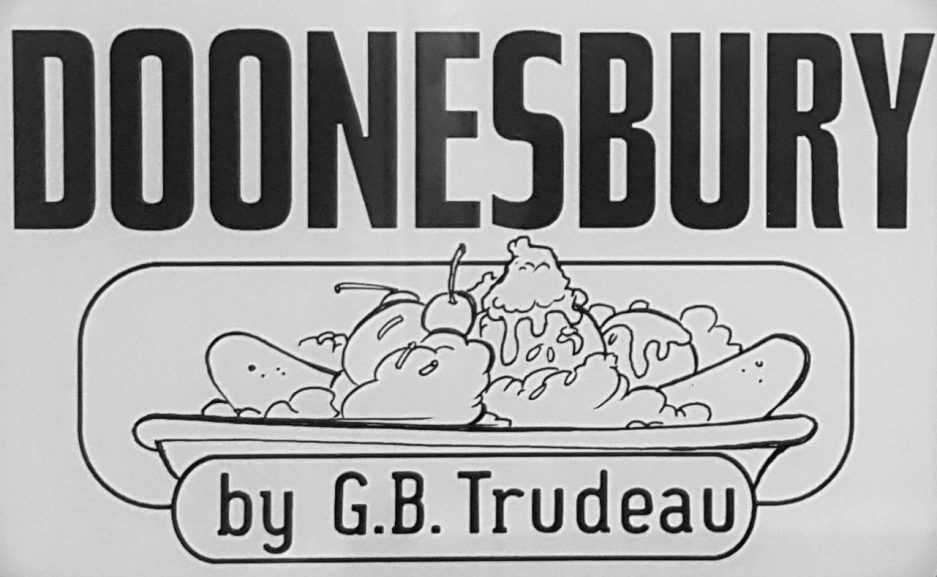On 13 September 2022, Iranian police arrested twenty-two-year-old Masha Amini for not wearing her hijab in the prescribed manner. The police beat her severely; three days later she died from cerebral trauma. In response, under the banner of “Women, Life, Freedom,” Iranians protested Amini’s death, Iran’s systematic oppression of women, and the regime’s very existence. … Continue reading “What a Breath of Fresh Air!”: Doonesbury on Iran and the Veil.
“An Experiment in Holy Fascism”: The Iranian Revolution Comes to Walden College
In November 1978, as protests against his regime escalated, the Shah of Iran instituted military rule and clamped down violently on street demonstrations. In an interview with The MacNeil/Lehrer Report, Shahriar Rouhani, an Iranian anti-Shah activist and a doctoral candidate in physics at Yale, described the situation in Iran as “a mere calm before the … Continue reading “An Experiment in Holy Fascism”: The Iranian Revolution Comes to Walden College
“Doesn’t Satire Have to Be Funny?”: Concluding Notes on Doonesbury in the Time of Monsters.
Welcome to the final instalment of my look into how Garry Trudeau has covered Donald Trump since first introducing him to Doonesbury in 1987. In this concluding post, I want to look at how Trump’s dominance of the political moment presents new challenges to satirists, and how those challenges have shaped Trudeau’s work in the … Continue reading “Doesn’t Satire Have to Be Funny?”: Concluding Notes on Doonesbury in the Time of Monsters.
“A Firehose of Awfulness”: Doonesbury on Trump, Madness, and Rape
Last time out, I examined how events such as COVID, Donald Trump’s failed coup d’etat, and his subsequent legal woes contributed to Garry Trudeau – reflecting a broader trend among more liberal Americans who’ve lost patience with their MAGA co-citizens – turning his pen against those who had abandoned their civic responsibility to support a … Continue reading “A Firehose of Awfulness”: Doonesbury on Trump, Madness, and Rape
“Darwin. Right Again.” : Doonesbury on MAGA’s “Willing Griftees.”
This is the second part of my look at Doonesbury’s “Trump Quintet,” Garry Trudeau’s five-volume (and counting?) collection of strips about Donald Trump. Last time out, I examined how Trudeau traced the decades-long cultural and political dynamics that set the stage for a corrupt narcissist to seize the White House. I concluded by noting that … Continue reading “Darwin. Right Again.” : Doonesbury on MAGA’s “Willing Griftees.”
“A Cautionary Recap of the Life of a Genuinely Awful Human Being”: Donald Trump in Doonesbury.
In his introduction to a 1968 compilation of cartoons about Lyndon Johnson, Jules Feiffer quoted an 1831 essay describing political cartoonists as those who “insult inferiority of mind and expose defects of body … [and] aggravate what is already hideous,” about their targets. Good political cartoonists, Feiffer continued, had “a blackmailer’s savvy,” allowing them to … Continue reading “A Cautionary Recap of the Life of a Genuinely Awful Human Being”: Donald Trump in Doonesbury.
“Picking through the Rubble of Three Generations of U.S. Foreign Policy”: Carter’s “New Foundation” and Garry Trudeau’s Nonordinary Realities
In our last look at Doonesbury during the Carter years, we saw how Jimmy Carter’s fondness for political symbolism – initiatives like a “human rights award banquet” meant to bolster a new, rights-driven approach to foreign policy – played into Garry Trudeau’s takedown of the American political and cultural Establishment’s hypocritical support of the Shah … Continue reading “Picking through the Rubble of Three Generations of U.S. Foreign Policy”: Carter’s “New Foundation” and Garry Trudeau’s Nonordinary Realities
Interrogated, Brutalized, and Rarely Heard from Again: Doonesbury Goes to Iran.
Montreal Gazette, 26 January 1981. Thanks to Zan for the help getting this image. On 26 January 1981, the Montreal Gazette, the newspaper my family subscribed to, ran a front-page story about a comic strip that, at the time, I, like most young readers, had always skipped over on my way to Peanuts or B.C. … Continue reading Interrogated, Brutalized, and Rarely Heard from Again: Doonesbury Goes to Iran.
“Who Came of Age with Youthful Rage at My Lai”: Jimmy Thudpucker, Rock’n’Roll, and the Memory of Vietnam.
Doonesbury’s resident rock’n’roll legend Jimmy Thudpucker first made the cover of the Rolling Stone in September 1976, featured in an illustration for an article about the growing relationship between corporate rock and electoral politics. In February 1978, Thudpucker again graced the RS cover, this time as the subject of an “interview” (penned by Garry Trudeau) … Continue reading “Who Came of Age with Youthful Rage at My Lai”: Jimmy Thudpucker, Rock’n’Roll, and the Memory of Vietnam.
“Catchy Lyrics about Busing and Abortion”: Doonesbury, Rock’n’Roll, and Politics.
Last time out looking at Doonesbury in the Carter years, we focused on how Jimmy Carter’s early presidency was defined by symbolic gestures like cutbacks to limos for government officials, a live presidential phone-in, and wardrobe choices calculated to reinforce his “down home” vibes. This time, a look at how Garry Trudeau wrote about one … Continue reading “Catchy Lyrics about Busing and Abortion”: Doonesbury, Rock’n’Roll, and Politics.
